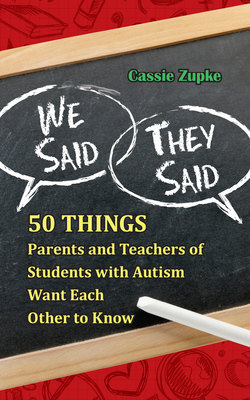Читать книгу We Said, They Said - Cassie Zupke - Страница 17
На сайте Литреса книга снята с продажи.
Оглавление
Many people with mild autism contributed to building our country's space program. Men and women who were fascinated with computers, engineering, and the stars focused their attention on the millions of details that make up a spacecraft and its support systems. Together, they helped build a pathway for space exploration and gathering knowledge about what exists beyond our planet.
Chefs have a fair number of people with mild autism in their ranks. Their extra-sensitive palates, their relentless passion to refine their results, and their insistence on maintaining structure and routines in their kitchens to ensure cleanliness and safety are necessary attributes in a chef. They're all traits of autism, too.
More than a few musicians and composers are on the autism spectrum. They play until their fingers bleed, and their extra-sensitive hearing and unique memories allow them to be able to turn the sounds in their minds into music that captivates us. Mathematicians, statisticians, and accountants are fascinated by numbers. They focus on details, enjoy routine, and are able to see the patterns mathematics make. Lawyers have encyclopedic memories and a relentless drive. Surgeons have an excellent grasp of spatial relationships, vast stores of knowledge, and a fascination with making complex body systems work as they should. While not all people who practice these trades have autism, many do.
It is believed that Nikola Tesla, Albert Einstein, and Thomas Edison may have had mild autism. Generations of lesser-known men and women have also used their autistic attributes to lead happy and productive lives. Their ability to hyperfocus and their attention to detail were called “persistence” and “craftsmanship.” Their fascination with special interests led them to become experts in their fields. They found trades that capitalized on their overresponsive sensory systems, and they improved their social skills until they no longer served as a barrier to finding employment or having relationships. Many people have succeeded in life not only despite their autism, but in some ways, because of it.
As a parent, I know this. I've seen examples of successful people in the books and articles I've read about autism, in the lectures I've attended, and in my consultations with experts. I've heard the stories from other moms in our group; we pass them around like soldiers passing a bottle of spirits around a campfire. They give us hope and courage and keep us warm and able to face tomorrow. These folks made it; our kids can, too. We tell this to each other and to ourselves, and we believe it. Most days.
But, we've all heard stories about the other people, too—the ones who are unable to overcome the difficulties autism can bring. We've heard about the lonely men and women, who are at odds with their families and who long for an intimate relationship but can't maintain one. There are people who are tormented by obsessive-compulsive disorder or who are so socially naive, they are in danger of being preyed upon. Unhealthy, inappropriate, or “odd” behaviors have kept a number of people from working or living independently. Some who lack an understanding of social concepts and have an inability to control their anger wind up in jail. And sadly, there are anxiety-driven adults and children who finally decide that suicide offers them the peace they couldn't find in life.
We've heard these stories, too. We don't talk about them, but we think about them.
The scary part is that there aren't any predictors that can tell us how our children will turn out. There are many people who were severely affected by autism as children, but thanks to therapeutic interventions, improved communication skills, medications, and a large dose of determination and passion, they have grown into fully functioning adults. They still have autism, but they cope with life well. There are also people whose strengths and weaknesses change very little throughout their lives. And there are children who begin life well but are overtaken later by uncontrollable anxiety, rage, and other issues that follow them into painful and sometimes dangerous adulthoods.
As I watch my child grow, I see him follow each of these paths at different times. Sometimes he's doing great. Other days aren't so good. Some days are scary, and sometimes days can turn into weeks and months of “scary.” We may be doing well now, but we've had the rug pulled out from under us before, many times. I know it could happen again, and there is no way I can stop it.
If I knew that my son had a good chance of ultimately being able to lead a happy adult life, I could live with the scary times. I could stay productive and positive and deal with today, so we can reach tomorrow. But I don't know this for certain. Neither do his doctors, teachers, therapists, or any other expert out there. There is no set developmental path for our kids. There are no indicators for how children with specific types of autism will develop. Therapies and interventions are essential. Good parenting is crucial. A great environment is priceless. But too often, these things aren't enough. Despite all our efforts, some of our kids don't make it. I've met their parents and cried with them and wondered if, someday, their pain is going to be mine.
Some kids with autism do well in life, and some don't. What will happen to mine?
